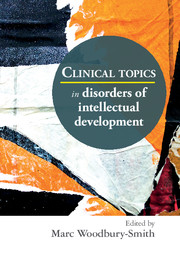Book contents
- Frontmatter
- Contents
- List of contributors
- Foreword
- Preface
- Part 1 Disorders of intellectual development: concept and epidemiology
- Part 2 Disorders of intellectual development: comorbidity and complications
- 3 Psychiatric illness and disorders of intellectual development: a dual diagnosis
- 4 Anxiety disorders
- 5 Behaviour problems
- 6 Epilepsy
- 7 The use of psychotropic medications to manage problem behaviours in adults
- Part 3 Autism spectrum disorder
- Part 4 Service provision
- Index
4 - Anxiety disorders
from Part 2 - Disorders of intellectual development: comorbidity and complications
Published online by Cambridge University Press: 01 January 2018
- Frontmatter
- Contents
- List of contributors
- Foreword
- Preface
- Part 1 Disorders of intellectual development: concept and epidemiology
- Part 2 Disorders of intellectual development: comorbidity and complications
- 3 Psychiatric illness and disorders of intellectual development: a dual diagnosis
- 4 Anxiety disorders
- 5 Behaviour problems
- 6 Epilepsy
- 7 The use of psychotropic medications to manage problem behaviours in adults
- Part 3 Autism spectrum disorder
- Part 4 Service provision
- Index
Summary
Anxiety is a universal human experience. It may be defined as a feeling of worry, nervousness or unease about something that has an uncertain outcome. A distressing emotion, consisting of both psychological and somatic manifestations and hyperarousal, it is frequently accompanied by behavioural reactions (Gabbard, 2014). At optimal levels, it is normal, motivational and protective and it is helpful in coping with adversity (the Yerkes–Dodson law; Yerkes & Dodson, 1906). Anxiety differs from fear, in that fear is a focused and direct response to a specific event or object that the person is consciously aware of. DSM-5 defines anxiety as: ‘anticipation of future threat’ and fear as ‘the emotional response to real or perceived imminent threat’ (American Psychiatric Association, 2013). Under ‘anxiety disorders’ it includes disorders that share features of excessive fear and anxiety and related behavioural disturbances, and the overlapping nature, similarities and differences between fear and anxiety are highlighted. Anxiety disorder, or pathological anxiety, occurs when the intensity or duration of anxiety is disproportionate to the potential for harm, or in the absence of recognisable threat to the individual. It involves increased levels of arousal, which has the effect of disorganising rather than facilitating an individual's performance. DSM-5 anxiety disorders include panic disorder, agoraphobia, specific phobias, generalised anxiety disorder, social phobia, obsessive–compulsive disorder (OCD), acute traumatic stress disorder and post-traumatic stress disorder (PTSD), anxiety disorder due to a general medical condition and substance-induced anxiety disorder.
Epidemiology
With a lifetime prevalence of 28.8% (Kessler, 2005), anxiety ranks among one of the most common categories of mental disorder reported in largescale epidemiological studies in the general population (Robins & Regier, 1991; Jenkins et al, 1997; Kessler, 2005). In primary care in the UK, where about a third of the annual 280 million consultations relate to mental health problems (Royal College of General Practitioners, 2006), anxiety and depression account for 80% of these consultations (Cooper, 1972). Nevertheless, there is general agreement that recognition rates of these conditions in primary care could be improved (Tylee & Walters, 2007). Untreated, anxiety disorders are costly to the individual and society.
- Type
- Chapter
- Information
- Clinical Topics in Disorders of Intellectual Development , pp. 58 - 71Publisher: Royal College of PsychiatristsPrint publication year: 2015



